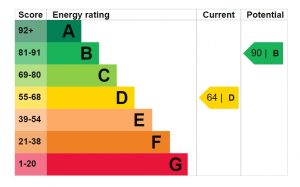Environmental Performance Certificate – Government Targets

Increasing the minimum Environmental Performance (EPC) rating is one of the ways in which the Government aims to achieve carbon reduction targets.
A recent Energy White Paper sets out the intention to make it unlawful to continue to let commercial property with an EPC rating below a Grade B by 2030 – subject to certain exemptions. The scheme will be achieved by phased implementation of compliance windows, increasing the minimum EPC rating required by a property.
The chronology is as follows:
Since April 2018, it has been unlawful for landlords to grant a new lease of a property with an EPC rating below E unless an exemption applies.
From April 2023 it will be unlawful for a landlord to continue to let a property with an EPC rating below E unless an exemption applies.
From April 2025 landlords of all leased commercial buildings within the scope of Minimum Energy Efficiency Standards (MEES) will have to present a valid EPC by registering it on a new PRS Exemptions and Compliance Database.
By April 2027, those landlords must have improved the EPC rating of the building to C or above or have registered an exemption.
By April 2028 landlords will have to present a valid EPC but this time must have improved the EPC rating of the building to B or above or have registered an exemption.

Exemptions currently include Grade Listed properties and some community premises (churches for example). Under the proposed legislation, these are likely to continue
In addition a Landlord will be able to apply to register an exemption under MEES on the central database, for up to 5 years. These exemptions include:
- Consent Exemption – this will apply where in the preceding 5 years the Landlord has been refused consent required for them to undertake improvement works after making reasonable efforts to obtain it. For example where a planning permission is refused or where the superior landlord’s or tenant’s approval is not granted.
- Devaluation Exemption – this applies where a surveyor confirms the works required would result in a reduction of more than 5% of the market value of the property.
- Payback Exemption – landlords are not required to undertake improvements if the cost of the changes required to meet the minimum MEES rating are unable to be recovered within a 7 year payback period.
Enforcement Penalties currently carry a maximum fine of up to £150,000. Fines of up to £5,000 for minor breaches will continue to apply and the list of breaches will be expanded to include failure to register property on the central database; failing to register a valid EPC by the dates set out in the proposed compliance windows; registering false or misleading information and failing to register an EPC after improvement works have been undertaken to demonstrate compliance. The breach may also be publicised to ‘name and shame’ landlords.
Christopher Thomas work closely with EPC and MEES consultants. As surveyors and agents we always look carefully at this with existing and new clients. The topic is unavoidable, often requiring careful consideration and management.


